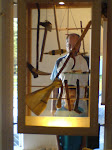söndag 5 augusti 2007
Now things I have discussed with a person standing near…
So this is more high thinking:
One parts ability to self-criticism won’t keep a relation going, definitely not in long-term…
If the (early) hurt or injured person takes responsibility for her/his injury or damage others space won’t have to be shrank, even if the damage and injury is big. People who care for each others want to help the best they can, show respect and consideration for each others damages etc. This is not burdening, but if you have to “save” the other person from his/her damage then you get exhausted. That is if the damaged want to flee from his/her damage and want help with this flight rather than taking care about it or doing something with the damage and injury; as trying to meet it, processing it and repairing it the best he/she can. Responsibility is the keyword if there shall be space for other people around the injured, damaged.
If one takes responsibility for ones injury and damage there is space for others around you and their possible injuries and damages too. All can exist with theirs. No one at the expense of any other person. No one that has to shrink his/her living space.
Even small wounds needs treatment. It’s not a question of who is more or less damaged!? Big wounds don’t take small wounds away. Neither if they are sitting on others nor on one and the same person. A wound is a wound. And to “live” on your wounds, taking advantage of them, profit by them, even benefiting on them, to parasitize on others sympathy and empathy – that’s really a flight from the pain itself and the damage, injury – those things that needs attention and processing, the opposite of responsible-taking.
Yes, there is always someone that is more hurt. And even small wounds needs treatment. If they don’t get they can cause more damage. Both for oneself and for others. Damage that wouldn’t be necessary at all.
We have spoken about communication, to give and to take. To narrate/tell and get to hear. But connected to this is the risk you loose the control, and thus the power (or can’t this mean a lot of possibilities too?)? A risk you take/can take: that the other part gets opportunity to talk and give her/his view on the whole!? But this also means that you perhaps are forced to listen and to hear!? Maybe this is too dangerous. In a way one gives the other part power? And maybe one doesn’t want to do that, for everything in the world!?
But of course there are limits for how long you can go here, strive and struggle and try and understand!! Of course you can get used and even exploited!! And that risk is greater if you are already damaged and haven’t got opportunity to process your damages enough… So, no, this ISN’T easy!!! (it is steadily more acknowledged that for instance women who were sexually abused, or abused in other ways as children, are at risk of landing in abusive relations as grown ups too! And the less hurt you have been the smaller is this risk!!! So some can really land in viscous circles, and are on top often stigmatized by the environment and the society, which is horrible isn’t it?).
An industry-man here in Sweden Michael Treschkow spoke on radio (Sommar). I didn’t listen to this programme, but he had said that he was glad Nelson Mandela wasn’t bitter!!! That he didn’t show any such signs!!! Without mentioning that the Swedish trade and industry union (Svenskt näringsliv) “earned a lot of money on the apartheid-regime” a female Swedish journalist said very ironically I felt, as a reply to that SHE was accused for carrying on propaganda for the communism in HER Sommar-programme!
That’s the other side of the coin?? Not being bitter, not behaving like a victim, a poor powerless victim, but “taking yourself in the collar” (as we say here) and show how clever you are despite the worse circumstances: rise from these, in the best case, to success!!! This will be applauded!!! Enormously! And you will become enormously admired!!! Every time you “stand up from your bed and walk away with it” as a Lazarus once did!?? How much you even sacrifice!! Even if the effects come high up in ages!! We are all human beings, even the strongest and cleverest have human limits!!?? Or do we need to believe in something else? Why?
Even in therapy, you have to avoid being a victim. This is worth a separate blogpost, but if you were a victim, of course you still are if you haven’t had or still don’t have opportunity to process it. You are, but you can be responsible-taking at the same time!!?? Jenson has written about this, about the prohibition against victim-feelings, and I think Bosch too.
Is this, to summarize this topic, “contempt for weakness”? That stems from early, I wonder? Many of us have needs for control, power – and strength!!?? And why is that?
To be able to admit to and address damage, the damage, injury has to be acknowledged by the damaged. To seek or search for excuses isn’t to acknowledge. Honestly wanting to acknowledge, even if it certainly is difficult and painful and probably even frightening!? And shouldn’t become minimised, but maybe it’s less scary than we thinks.
Relations between children and their respective parents: everything the parents think is bothersome, which had demanded a little processing from the parents parts/side, for instance “Why am I so afraid for my husband (wife??) when he (she?) gets angry?” could end in a divorce depending on how the man (woman??) reacts on the woman’s (man’s) questioning of his (her) “right” to vomit or belch out his (her) temper or mood on the nearest victim. Everything the parents think is bothersome – which had risked their status quo in life – the children have to take, carry, stand, repair etc.
I think the roots to all these things lies early in life. Which doesn’t mean later experiences doesn’t count… Or should become diminished.
One parts ability to self-criticism won’t keep a relation going, definitely not in long-term…
If the (early) hurt or injured person takes responsibility for her/his injury or damage others space won’t have to be shrank, even if the damage and injury is big. People who care for each others want to help the best they can, show respect and consideration for each others damages etc. This is not burdening, but if you have to “save” the other person from his/her damage then you get exhausted. That is if the damaged want to flee from his/her damage and want help with this flight rather than taking care about it or doing something with the damage and injury; as trying to meet it, processing it and repairing it the best he/she can. Responsibility is the keyword if there shall be space for other people around the injured, damaged.
If one takes responsibility for ones injury and damage there is space for others around you and their possible injuries and damages too. All can exist with theirs. No one at the expense of any other person. No one that has to shrink his/her living space.
Even small wounds needs treatment. It’s not a question of who is more or less damaged!? Big wounds don’t take small wounds away. Neither if they are sitting on others nor on one and the same person. A wound is a wound. And to “live” on your wounds, taking advantage of them, profit by them, even benefiting on them, to parasitize on others sympathy and empathy – that’s really a flight from the pain itself and the damage, injury – those things that needs attention and processing, the opposite of responsible-taking.
Yes, there is always someone that is more hurt. And even small wounds needs treatment. If they don’t get they can cause more damage. Both for oneself and for others. Damage that wouldn’t be necessary at all.
We have spoken about communication, to give and to take. To narrate/tell and get to hear. But connected to this is the risk you loose the control, and thus the power (or can’t this mean a lot of possibilities too?)? A risk you take/can take: that the other part gets opportunity to talk and give her/his view on the whole!? But this also means that you perhaps are forced to listen and to hear!? Maybe this is too dangerous. In a way one gives the other part power? And maybe one doesn’t want to do that, for everything in the world!?
But of course there are limits for how long you can go here, strive and struggle and try and understand!! Of course you can get used and even exploited!! And that risk is greater if you are already damaged and haven’t got opportunity to process your damages enough… So, no, this ISN’T easy!!! (it is steadily more acknowledged that for instance women who were sexually abused, or abused in other ways as children, are at risk of landing in abusive relations as grown ups too! And the less hurt you have been the smaller is this risk!!! So some can really land in viscous circles, and are on top often stigmatized by the environment and the society, which is horrible isn’t it?).
An industry-man here in Sweden Michael Treschkow spoke on radio (Sommar). I didn’t listen to this programme, but he had said that he was glad Nelson Mandela wasn’t bitter!!! That he didn’t show any such signs!!! Without mentioning that the Swedish trade and industry union (Svenskt näringsliv) “earned a lot of money on the apartheid-regime” a female Swedish journalist said very ironically I felt, as a reply to that SHE was accused for carrying on propaganda for the communism in HER Sommar-programme!
That’s the other side of the coin?? Not being bitter, not behaving like a victim, a poor powerless victim, but “taking yourself in the collar” (as we say here) and show how clever you are despite the worse circumstances: rise from these, in the best case, to success!!! This will be applauded!!! Enormously! And you will become enormously admired!!! Every time you “stand up from your bed and walk away with it” as a Lazarus once did!?? How much you even sacrifice!! Even if the effects come high up in ages!! We are all human beings, even the strongest and cleverest have human limits!!?? Or do we need to believe in something else? Why?
Even in therapy, you have to avoid being a victim. This is worth a separate blogpost, but if you were a victim, of course you still are if you haven’t had or still don’t have opportunity to process it. You are, but you can be responsible-taking at the same time!!?? Jenson has written about this, about the prohibition against victim-feelings, and I think Bosch too.
Is this, to summarize this topic, “contempt for weakness”? That stems from early, I wonder? Many of us have needs for control, power – and strength!!?? And why is that?
To be able to admit to and address damage, the damage, injury has to be acknowledged by the damaged. To seek or search for excuses isn’t to acknowledge. Honestly wanting to acknowledge, even if it certainly is difficult and painful and probably even frightening!? And shouldn’t become minimised, but maybe it’s less scary than we thinks.
Relations between children and their respective parents: everything the parents think is bothersome, which had demanded a little processing from the parents parts/side, for instance “Why am I so afraid for my husband (wife??) when he (she?) gets angry?” could end in a divorce depending on how the man (woman??) reacts on the woman’s (man’s) questioning of his (her) “right” to vomit or belch out his (her) temper or mood on the nearest victim. Everything the parents think is bothersome – which had risked their status quo in life – the children have to take, carry, stand, repair etc.
I think the roots to all these things lies early in life. Which doesn’t mean later experiences doesn’t count… Or should become diminished.
Prenumerera på:
Kommentarer till inlägget (Atom)





























Inga kommentarer:
Skicka en kommentar